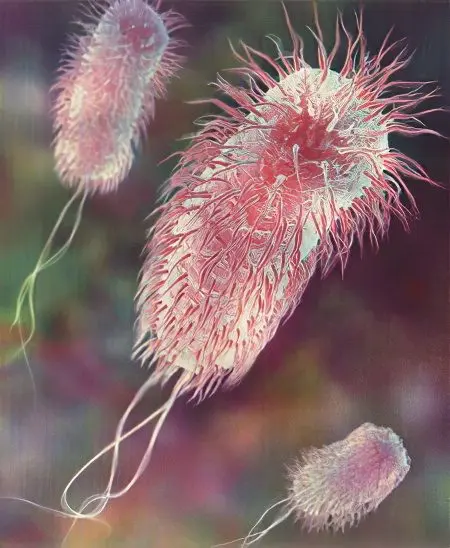Contents
What is Escherichia coli?

E. coli (Escherichia coli, E. coli) is a rod-shaped bacterium belonging to the group of facultative anaerobes (lives and reproduces only in the absence of direct oxygen). E. coli has many strains, most of which belong to the natural microflora of the human intestines and help prevent the development of harmful microorganisms and synthesize vitamin K. However, some of its varieties (for example, the O157:H7 serotype) can cause serious poisoning, intestinal dysbacteriosis and colibacillosis.
The normal intestinal microflora includes many microorganisms, including lactobacilli, enterococci, streptococci, and so on. The strains of these bacteria are in balance, but if the latter is disturbed in any way, pathogenic microorganisms will begin to multiply intensively. At the same time, the processes of fermentation and decay are activated, causing the development of serious diseases.
Some strains of Escherichia coli cause not only diseases of the gastrointestinal tract, but also affect the genitourinary system, provoke colpitis, cystitis, prostatitis, meningitis in infants, sometimes cause the development of hemolytic-uremic syndrome, peritonitis, mastitis, pneumonia and sepsis.
Causes of diseases caused by Escherichia coli
Digestive disorders, reproduction of the pathogenic serotype of Escherichia coli and dysbacteriosis can occur due to many diseases of the digestive system, especially the pancreas (pancreatitis) and intestines (colitis, enterocolitis).
In addition, the intake of certain antibiotics that suppress those microorganisms that are responsible for preventing the reproduction of pathogenic flora can disrupt the normal intestinal microflora.
To avoid dysbacteriosis and digestive disorders, it is necessary to choose the right antibacterial drugs, their dose and those medicines that will protect the normal intestinal microflora.
Infection with pathogenic strains of Escherichia coli occurs mainly by the fecal-oral route. Contributes to the development of diseases, violation of the rules of hygiene in cooking, the use of dirty fruits and vegetables, the use of water for irrigation, polluted or waste. It is also dangerous to eat undercooked meat or drink unboiled milk, because cows, goats, pigs and sheep can be carriers of pathogenic strains of E. coli.
Symptoms of Escherichia coli
Food poisoning caused by some strains of E. coli is dangerous because of the toxins they release. Some of these toxins are potentially lethal. Detect pathogenic microorganisms in the mucous membranes of the gastrointestinal tract and inflamed tissues (foci of inflammation).
Symptoms of Escherichia coli become a detailed clinical picture of intestinal dysbacteriosis: in addition to stool disorders (constipation, diarrhea), the patient has nausea and vomiting, bloating and abdominal pain. The smell of feces changes, bad breath appears. Among the symptoms of general intoxication are increased fatigue, weakness, drowsiness, lack of appetite.
Getting rid of E. coli
Treatment of Escherichia coli consists in taking specially selected antibiotics. Most often, these are drugs from the group of aminoglycosides. To make the treatment more effective, the patient is recommended to do a culture of the contents of the intestine. If E. coli caused diarrhea, it is necessary to restore the water and electrolyte balance with the help of rehydration. In general, treatment depends primarily on the strain of E. coli.









